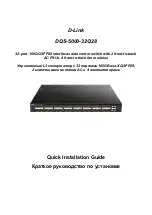
SNMP-based Management
The switch can be managed with an SNMP-compatible console program. The switch
supports SNMP v1, SNMPv2c and SNMPv3.
Connecting to the Console Port
The front panel of the switch provides an RJ-45 console port to connect a remote system
for monitoring and configuring the switch.
To use the RJ-45 console port, the following equipment is needed:
A terminal or a computer with both an RS-232 serial port and terminal emulation
software
A console cable with a male DB9 connector on one end and an RJ-45 connection
on the other
To connect the RJ-45 console port on the switch to the computer:
Connect the male DB9 connector on the console cable (shipped with the switch) to
the RS-232 serial port on the computer running terminal emulation software, then
insert the RJ-45 connector into the console port on the front of the switch.
To configure the terminal emulation software as follows:
Select the appropriate serial port (COM1 or COM2).
Set the data rate to 115200 baud.
Set the data format to 8 data bits, 1 stop bit, and no parity.
Set flow control to none.
Select VT100 for Emulation mode.
Select Terminal keys for Function, Arrow and Ctrl keys.
Figure 5 — COM port configuration
To be able to view the boot procedure, the switch needs to be rebooted. The simplest way,
at this stage, to reboot the switch is to unplug and re-insert the power cable from and into
the power receptacle on the back of the switch. Then select an operating system to boot
6



































